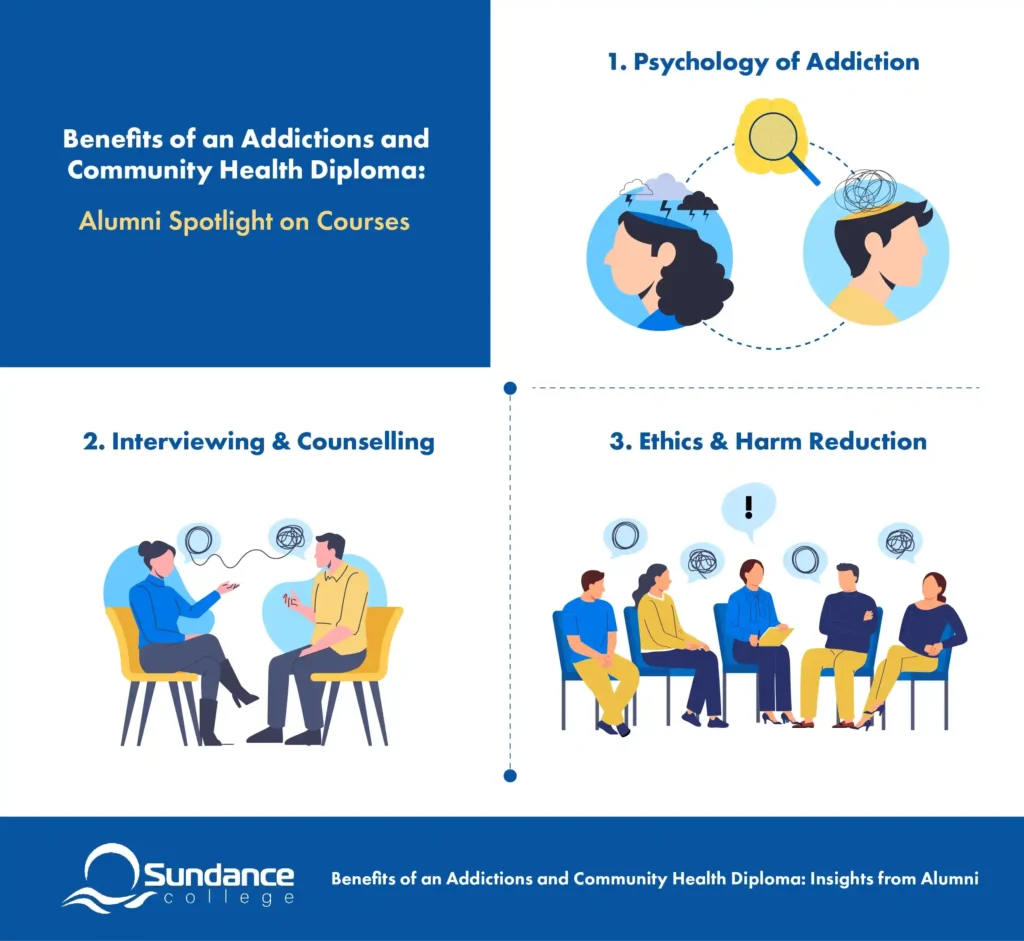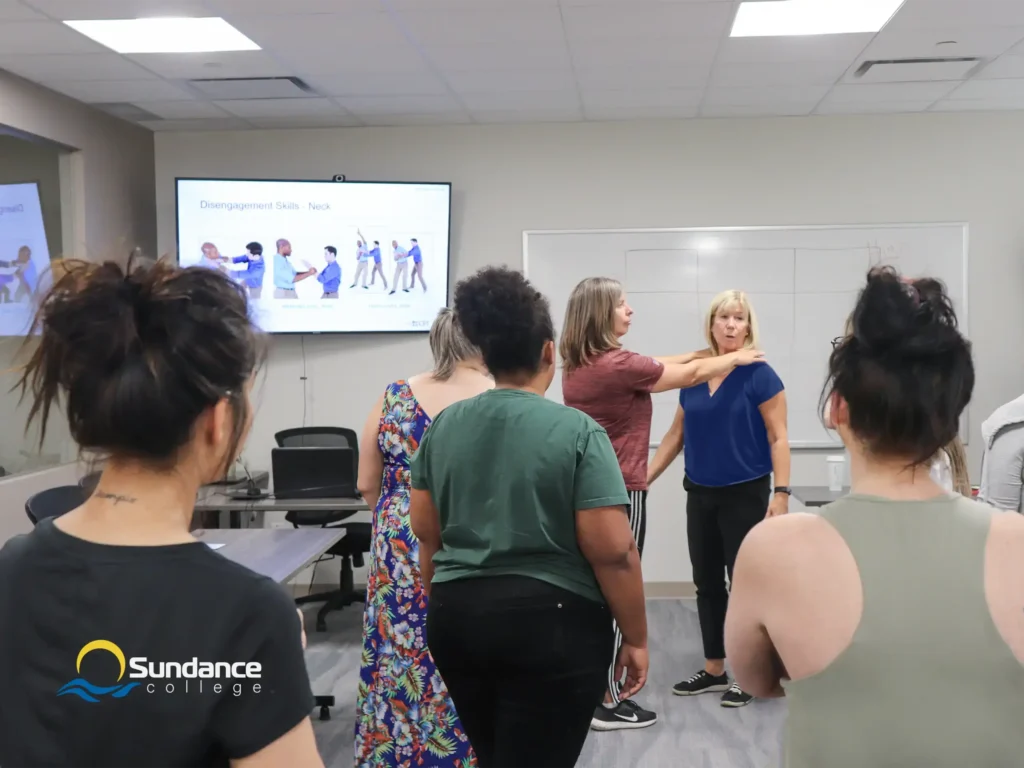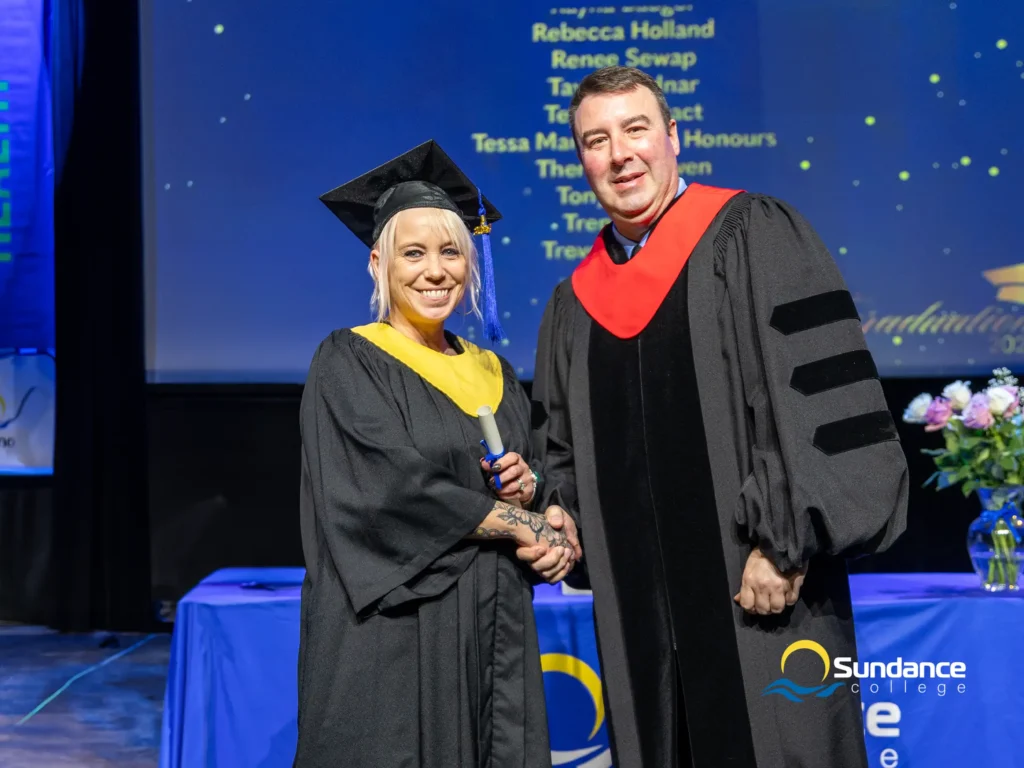Blog / Benefits of an Addictions and Community Health Diploma: Insights from Alumni
Benefits of an Addictions and Community Health Diploma: Insights from Alumni

Addictions and Community Health Professional Diploma
- Addictions Worker
- Youth Support Worker
- Family Support Worker
- Drop-in Centre Worker
Table of Contents
What draws people into working with those struggling with addictions? Many people have personal stories of addiction. They may have experienced it themselves or watched loved ones struggle with detox, rehab, or substance abuse.
Our Addictions and Community Health Professional (ACHP) diploma students share their reasons:
- Leah B.: “I chose this program after being clean for eight years.”
- Ashley H.: “I lost my brother to addiction and wanted to give back in his honour.”
- Jessica T.: “Addiction has affected my family for years. Seeing my dad get sober inspired me to help others do the same.”
If you relate to these experiences, you may wonder how an addictions studies diploma can benefit you. A holistic education approach is crucial for success in this field. It’s not just about skills; it’s also about being personally ready.
Learn how an Addictions and Community Health diploma program can prepare you for a rewarding career in the addictions field. Learn about the skills you’ll gain and how it can lead you to success, just like our graduates.
Listen to “Benefits of an Addictions and Community Health Diploma: Insights from Alumni”
Why Study Addictions?
“I was married to an alcoholic for 30 years… I enrolled in the Addictions and Community Health Professional program to understand alcoholism. I wanted to learn more about why I chose a partner with addiction issues. I also wanted to figure out why our marriage was experiencing problems.” shares ACHP program student Catherine E.
Catherine, like other ACHP students, studies addictions to better understand people. An addictions studies diploma program can shed light on various types of addiction, from substance abuse to gambling and food addiction.
Some students, like Robert S., are drawn to this field due to their empathetic and personable nature. “I genuinely care about people and enjoy making them feel loved. Enrolling in the Addictions program, I believed I could make a real difference.”
Jessica T. was inspired by a loved one’s sobriety journey:
“The Addictions studies diploma caught my eye due to its impact on my family. After helping my dad achieve sobriety, I wanted to assist others. Witnessing his sobriety and its positive effects on our family dynamics was inspiring.”
These ACHP students each had their own personal reasons for enrolling in our diploma program. But how did their addictions and mental health education prepare them for a new impactful career? Let’s explore our diploma program in detail.
What Our Students Learn from Their Addiction Studies Diploma
Our previous guide covers the ACHP program from instructors’ perspectives. In this article, we’ll explore from the point of view of students and alumni. Our Addictions and Community Health Diploma program consists of 12 courses, with each course focusing on a different area of the field. Let’s take a look at three of the most popular ACHP courses and how they helped our students and graduates.

1. Psychology Of Addiction
This course explores the fundamentals of psychological disorders education in relation to daily life. Students explore neuroscience, behavior, sensation, perception, motivation, emotion, thinking, and development. It also covers knowledge and treatment of psychological disorders.
Reflecting on the Psychology of Addiction course, Robert S. shares: “I definitely enjoyed learning how the brain works and how your memory functions at all ages, starting from birth. It was all very informative. I soaked up as much as I could to help me in my career.”
Like Robert, taking this course can give you a thorough understanding of how the human brain works and is affected by substance use, preparing you to effectively provide client-centered care and support individuals struggling with addiction.
2. Interviewing & Counselling
In this course, students analyze ethics, values, and self-awareness while learning about the skills, processes, and pitfalls of counselling. It also covers evidence-based treatment approaches for motivating clients and examines the Canadian health services structures that define the uniqueness of the Canadian counselling environment.
One of our ACHP students, Leah, shared how this course impacted her: “My demeanor, body language, and communication style have improved significantly since the first class, where I realized how closed off I used to be. I learned more during the counselling skills interview, which emphasized these aspects. Mastering how to slow down, step back, and actively listen to others has been especially helpful for me.”
No matter what career path in addictions and community health you choose, having empathetic interviewing and professional counselling skills is critical for your success in this field. This course equips you with that essential expertise, just as it did for Leah.
3. Ethics & Harm Reduction

This course provides an in-depth look at the counselling process, focusing on the counsellor as a professional. Topics include an introduction to the helping professions, working with difficult clients, values and diversity in counselling, ethical relationship issues, boundary issues, working with groups and families, community counselling, and crisis work.
Graduate, Jessica T., says, “I found the harm reduction strategies especially valuable. Learning ways to help those struggling with addiction and how to reduce their addiction before getting them sober, was really eye-opening.”
In the field of addictions, your primary task will be to effectively support and guide people struggling with addictions in their journey toward recovery. This requires extensive knowledge of ethical counselling practices.
The Role of Practicum Experience in Our Alumni’s Addictions Careers
Why is practical experience important for students nearing graduation? It allows them to apply their knowledge to real-world applications, working with individuals struggling with addiction and substance use disorders. This experience bridges the gap between theory and practice.
The Sundance College Addictions and Community Health Professional program includes a 7-week practicum in a community mental health center, social service or outreach agency, corrections facility, or another human services agency. Here is what our ACHP graduates have achieved during their practicum experiences:
- Jessica T.: “I did my practicum at the John Howard Society of Brandon, Manitoba. It broadened my perspective on homelessness, addictions, and mental health.”
- Tolulope O.: “I worked with elderly individuals at a personal care service, counseling them and collaborating with medical staff.”
- Shelley B.: “I did my practicum at Revive and Thrive Thrift Wholesale store, witnessing people succeed in workforce programs.”
Like these alumni, your practicum will be a vital part of your addiction studies diploma, helping you develop skills, gain experience, and prepare for a career in the field.
How Has the Addictions Studies Diploma Benefitted Sundance Graduates?

Career paths in addictions and community health are diverse, offering opportunities in areas such as addictions, child and youth care, community outreach support, and women’s shelters. Our Addictions and Community Health graduates often secure employment before graduation:
- Jessica T., ACHP graduate, transitioned from a finance utility clerk to a crisis support worker: “Before deciding to take my diploma in addictions, I was a finance utility clerk and also worked as a porter at Riverheights Terrace in Brandon, MB. After graduation, I’ve been working on a crisis support line at the Men’s Resource Center of the John Howard Society of Brandon. I also work at the YWCA Western Women’s Shelter.”
- Shelley B. went from being unemployed to a youth facilitator coordinator: “I work in youth care, helping those aging out of the system transition to independent living. I assist them in preparing for life on their own and becoming successful adults. I am a facilitator coordinator in an independent living facility.”
- For Ashley H., earning her ACHP diploma marked a career shift to a community outreach support worker: “I was a heavy equipment operator with long hours, but I needed a change for my family. Sundance College prepared me well, and I secured a position in a harm reduction unit even before graduation. Shortly after, I transitioned to a full-time role as a community outreach support worker.”
Our graduate success stories exemplify how people from diverse backgrounds across Canada, with the right education and dedication, find immediate career opportunities in addictions and community health. We invite you to join their ranks!
They Did It! Now is Your Turn to Start a Career in Addictions
The courses mentioned above are just a part of our Addictions and Community Health Diploma program.
Other courses include crisis intervention techniques, health prevention and promotion strategies, group facilitation, and much more.
And those are just a few examples of how Sundance students are making a difference. Imagine how many lives you can change! Take your first step today.
Simply provide your contact information and one of our advisors will reach out to you. They can discuss every detail of the ACHP program, including program duration, enrollment requirements, and financial aid options available for you. Start your new rewarding career in less than a year!
Related Blogs
Subscribe for more career advice
Blog Categories
Share on:
